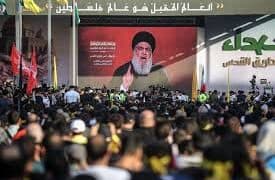Hezbollah leader Hassan Nasrallah recently delivered a televised speech addressing the ongoing conflict between his militia and Israel along the Lebanon-Israel border. Nasrallah stated that Hezbollah is currently engaged in unprecedented fighting and warned of a potential escalation as the Israel-Hamas war approaches its one-month mark.
Despite refraining from announcing full involvement in the war, Nasrallah’s remarks indicated that Hezbollah is prepared for various options and can resort to them at any time. He also dismissed the United States’ warning against Hezbollah’s participation, stating that it would not intimidate his militia.
In recent weeks, Hezbollah has launched rockets into northern Israel, mainly targeting military installations. However, they possess a significant arsenal capable of reaching any part of Israel. Nasrallah’s speech was highly anticipated as an indicator of whether the conflict between Israel and Hamas would escalate into a regional war.
Nasrallah clarified that Hezbollah had already entered the battle on October 8 through its cross-border strikes, diverting Israeli forces from their focus on Hamas in Gaza. Thousands of people gathered in Beirut to watch his speech, and celebratory gunshots were heard in the city.
The recent escalation on the Israel-Lebanon border included Hezbollah firing mortar shells, anti-tank missiles, and exploding drones—an unprecedented development. Meanwhile, in Israel, U.S. Secretary of State Antony Blinken met with Prime Minister Benjamin Netanyahu to discuss the protection of civilians in the conflict with Hamas.
Nasrallah criticized the strong U.S. support for Israel’s bombardment of Gaza, expressing discontent over the high number of civilian casualties. He also praised Hamas’ attack on southern Israel on October 7, which resulted in the deaths of over 1,400 people, mostly civilians.
While Hamas leaders have publicly encouraged Hezbollah to increase its involvement in the war, Hezbollah has not set a specific red line for engagement. Instead, they have taken measured steps to keep Israel occupied on the Lebanese border without triggering an all-out war.
The Israeli military reported casualties on both sides of the conflict, with seven soldiers and one civilian killed on the northern border. On the Lebanese side, more than 50 Hezbollah fighters, ten militants from allied groups, and ten civilians, including a Reuters journalist, have been killed.
A full-scale conflict with Israel would be costly for Hezbollah, considering the destruction caused during the 2006 war. Additionally, it would displace many of Hezbollah’s supporters in southern Lebanon and exacerbate Lebanon’s existing economic crisis.
Experts believe that both Nasrallah and Blinken signaled against a wider war in their recent statements. However, the situation remains volatile, and the conflict’s trajectory will depend on the actions of key actors involved.
Stay informed with supply chain news on The Supply Chain Report. Free tools for international trade are at ADAMftd.com.
#Hezbollah #HassanNasrallah #LebanonIsraelConflict #IsraelHamasWar #CrossBorderStrikes #MiddleEastTensions #HezbollahRockets #NasrallahSpeech #RegionalWar #USIsraelSupport #GazaBombardment #LebanonCrisis #IsraelDefense #IsraelHezbollah #MiddleEastPolitics #AntonyBlinken #IsraelLebanonBorder















